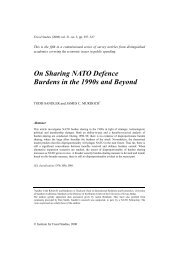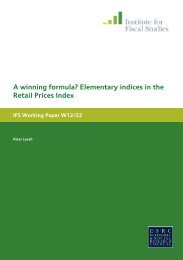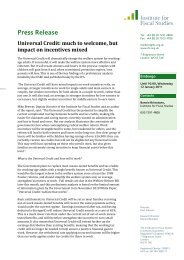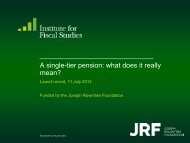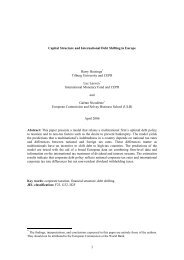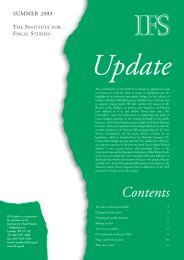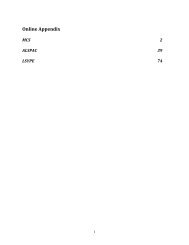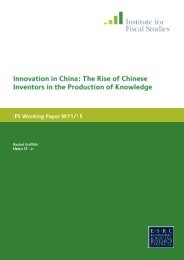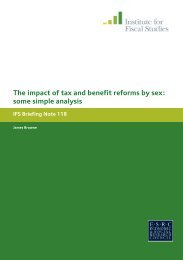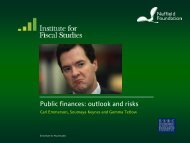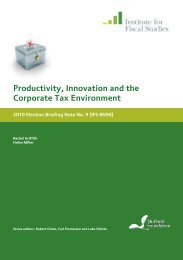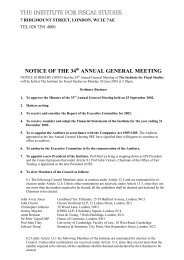A single-tier pension: what does it really mean? - The Institute For ...
A single-tier pension: what does it really mean? - The Institute For ...
A single-tier pension: what does it really mean? - The Institute For ...
Create successful ePaper yourself
Turn your PDF publications into a flip-book with our unique Google optimized e-Paper software.
Current state <strong>pension</strong> system<br />
• Anyone earning between the LEL and the lower earnings threshold (LET) or<br />
engaged in other cred<strong>it</strong>able activ<strong>it</strong>ies (as detailed in Table 2.1) accrues<br />
ent<strong>it</strong>lement to a flat-rate amount of S2P income. A year of flat-rate accrual is<br />
equal to approximately £1.70 of weekly <strong>pension</strong> income. 9<br />
• Anyone earning above the LET accrues ent<strong>it</strong>lement to this same flat-rate<br />
amount but also accrues add<strong>it</strong>ional ent<strong>it</strong>lement that is proportional to the<br />
level of their earnings between the LET and the upper accrual point (UAP).<br />
<strong>The</strong> maximum S2P ent<strong>it</strong>lement one can currently accrue in 2013–14 terms is<br />
approximately £2.76.<br />
Add<strong>it</strong>ional S2P ent<strong>it</strong>lement can be accrued for every year of working life. <strong>The</strong><br />
maximum potential length of working life depends on one’s SPA: for example,<br />
someone who turned 16 in 1978 10 (w<strong>it</strong>h a SPA of 67 under the latest proposals)<br />
has a potential working life of 51 years (from age 16 to age 66, inclusive).<br />
To illustrate how accruals operate under the current system, Box 2.1 describes<br />
three example people and explains how much extra state <strong>pension</strong> income they<br />
Box 2.1. Examples of future state <strong>pension</strong> accrual under current<br />
legislation<br />
<strong>The</strong> following examples describe hypothetical individuals in the year 2016. All<br />
monetary figures are expressed in 2013–14 earnings terms.<br />
Lucinda is 35 years old, is employed and earns £900 a week. She regularly saves<br />
money into a personal <strong>pension</strong> and also receives a <strong>pension</strong> contribution from her<br />
employer. In return for paying National Insurance contributions on her earnings<br />
for a year, Lucinda will accrue extra state <strong>pension</strong> income worth £6.20 per week,<br />
which she will receive from the age of 68.<br />
Jacob is 29 years old, is employed and earns £115 per week. He <strong>does</strong> not save in<br />
a private <strong>pension</strong>. In return for paying NI contributions on his earnings for a<br />
year, Jacob will accrue extra state <strong>pension</strong> income worth £5.30 per week, which<br />
he will receive from the age of 68.<br />
Yousef is 58 years old and spends 35 hours a week caring for his mother.<br />
Between the ages of 20 and 55, he was self-employed and paid class 2 NI<br />
contributions; he therefore already has full ent<strong>it</strong>lement to the BSP. In<br />
recogn<strong>it</strong>ion of his caring responsibil<strong>it</strong>ies, Jacob will accrue extra state <strong>pension</strong><br />
income worth £1.70 per week, which he will receive from the age of 66.<br />
2013–14 earnings terms, they will appear to be slightly lower than the nominal thresholds today.<br />
We assume that average earnings growth evolves as forecast by the Office for Budget<br />
Responsibil<strong>it</strong>y (Q2 average earnings growth from the Economy Supplementary Tables<br />
accompanying Office for Budget Responsibil<strong>it</strong>y (2013)).<br />
9<br />
This ‘flat-rate accrual amount’ is set in legislation and uprated w<strong>it</strong>h average earnings growth<br />
each year.<br />
10 Earnings-related state <strong>pension</strong> accrual began in April 1978.<br />
7



